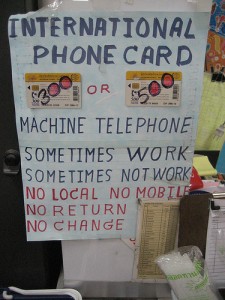 It may sound like a foreign concept to some, but mobile devices – and the content on those mobile devices, such as apps – are consumed by… consumers. When it comes to content delivery on said devices, everything is well and good — until it is not; at that point, customers need some sort of assistance to resolve the issue(s) they are having otherwise they feel shafted by the company or companies they are dealing with. Because of Google’s lack of direct interaction with customers (i.e. they don’t do very much direct selling to regular consumers, most of their sales are business to business and revolve around their advertising platform), Google has never had a very good customer support apparatus. For example, if you have issues with purchases on Android Market – the main (only) medium of content delivery by Google on Android devices –
It may sound like a foreign concept to some, but mobile devices – and the content on those mobile devices, such as apps – are consumed by… consumers. When it comes to content delivery on said devices, everything is well and good — until it is not; at that point, customers need some sort of assistance to resolve the issue(s) they are having otherwise they feel shafted by the company or companies they are dealing with. Because of Google’s lack of direct interaction with customers (i.e. they don’t do very much direct selling to regular consumers, most of their sales are business to business and revolve around their advertising platform), Google has never had a very good customer support apparatus. For example, if you have issues with purchases on Android Market – the main (only) medium of content delivery by Google on Android devices – there really isn’t a phone number you can call to talk to a Google customer rep to get help. Your choices are either try to contact the developer of the content (apps, movies, books, etc.) you purchased (or downloaded for free — free stuff needs support too, ya’ know), troll some online forums (Google’s customer service is typically levied through online forums) to try to get some answers, or just suck it up. This method of dealing with customers may work initially, but as a platform or service grows, the number of issues customers have tend to grow; and lack of proper attention given to these issues can cause major problems. This is why I (semi-humbly) predict Amazon will dominate content delivery on mobile devices (smartphones and tablets) in the near future.
Update: Okay so it appears Google does provide customer service for Android Market via phone and e-mail. However, that service apparently isn’t very good. Thanks Tejas for the heads up!
^ Image credit: 23am
Those of you that follow the mobile tech world know Amazon has made a push into content delivery by introducing Amazon Appstore for Android and, most recently, announcing their own tablet, the Kindle Fire. For Amazon Appstore many have questioned Amazon’s move because obviously it is hard for a third-party app store to successfully (read: profitably) compete with the built-in, natively supported Android Market; for the Kindle Fire some critics weren’t happy with Amazon’s high-risk business strategy of making little to no profit (some even say a loss) on the initial sale of the Kindle Fire and depending on revenue from future content purchases on the Fire to make money. However, I say Amazon will be successful in both these endeavors (and, as a result, will probably launch their own phone and a larger tablet too) because of one big reason: Superior customer service.
Anyone that has used Amazon – either purchasing directly from Amazon, their Marketplace, or other Amazon services – knows the purchases are backed by top quality customer service. Have any issues? Pick up the phone and call Amazon; or e-mail them; or chat with them live. As I am sure many can attest to, Amazon-related issues are often solved in a satisfactory manner in a satisfactory amount of time. This type of customer service is what is currently missing in Android Market (I don’t know about Apple App Store since I have never used it, but I do know Apple has great customer service for their devices… if you purchase an Apple Care warranty); and if Amazon is able to extend this excellent customer service to back their content delivery on mobile platforms, they are sure to be a dominant competitor.
I say “if” because Amazon’s venture into content delivery on mobile platforms is fairly new so only time will tell if their pro-customer strategy is implemented in this department of their business or not. However, from my experience so far, it looks like it is. For example, today I got an e-mail from Amazon telling me a paid app which I own is no longer being offered on Amazon Appstore; so Amazon is providing a way for their customers who own this app to still be able to use it without paying another dime:
Of course credit must be given where it is due: The developer of the app in question (probably) played a large role in providing people with access to the app even after it has been discounted; so Amazon can’t fully take the glory especially considering for this specific example the same service is being offered by the developer of the app for people who bought the app via Android Market. However, regardless of which party is the impetus behind this, it is Amazon that e-mailed me about this; it is Amazon that is providing me directions on how to do go about accessing the app even after discontinuation. I highly doubt Google would have done the same if I bought the app from Android Market (the developer of the app may or may not have, I don’t know). In my book, it is Amazon’s customer service that earns kudos for informing me about this development, especially considering the fact that I didn’t even pay for the app in question — I got it for free from Amazon’s Free App of the Day. This may be naive logic, but the age old idea of “if they do this for me for something I don’t even pay for, I wonder what lengths they will go for me when I give them my money” applies here.
Recently I read an editorial on CNN that claimed Jeff Bezos (the founder and CEO of Amazon) is the next Steve Jobs. To make a similar comparison, if Amazon is able to provide mobile content backed with excellent customer support and high level of service, five years down the road it may be legions of Amazon fanboys armed with Kindle phones and tablets that troll the Internet.

 Email article
Email article




